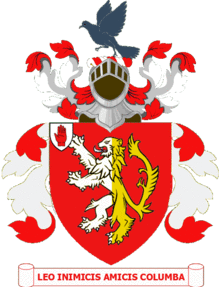Sir Charles Wentworth Dilke 1st baronet | |
|---|---|
 | |
| Born | 18 February 1810 |
| Died | 10 May 1869 (aged 59) London |
| Education | Trinity Hall, Cambridge |
| Occupation | Politician Writer Journalist |
| Known for | Member of the 19th Parliament of the United Kingdom The Athenaeum |
| Spouse(s) | Mary Chattfield (1840–1853) |
| Children | Sir Charles Dilke, 2nd Baronet Ashton Wentworth Dilke Mildred Dilke |
| Parent(s) | Charles Wentworth Dilke and Maria Dove Walker |
Sir Charles Wentworth Dilke, 1st Baronet (18 February 1810 – 10 May 1869), was an English art patron, horticulturalist and Whig politician. He is best remembered as one of the chief promoters of the Great Exhibition of 1851.
Background and education
Dilke was born in London,[1] the son of Charles Wentworth Dilke, proprietor and editor of the Athenaeum, by his wife Maria Dove Walker.[2] He was educated at Westminster School and Trinity Hall, Cambridge.[3] He helped pass the parliamentary Reform Act of 1832, enacted under the Whig administration of Lord Grey. He studied law, and in 1834 took his degree of LL.B., but did not practise.[1]
Public life
Dilke assisted his father in his literary work, and was for some years chairman of the council of the Society of Arts, besides taking a prominent part in the affairs of the Royal Horticultural Society and other bodies. In 1841 he co-founded The Gardeners' Chronicle alongside Joseph Paxton, John Lindley and William Bradbury. He was one of the most zealous promoters of the Great Exhibition of 1851 (of which Paxton was again an integral part), and a member of the executive committee. At the close of the exhibition he was honoured by foreign sovereigns, and the queen offered him knighthood, which, however, he did not accept. He also declined a large remuneration offered by the royal commission. In 1853 Dilke was one of the English commissioners at the New York Industrial Exhibition, and prepared a report on it. He again declined to receive any money reward for his services.[1]
Dilke was appointed one of the five royal commissioners for the Great Exhibition of 1862.[1] Soon after the death of the prince consort he was created a baronet, of Sloane Street in the County of Middlesex.[4] In 1865 he entered parliament as member for Wallingford,[5] a seat he held until 1868. In 1869 he was sent to Russia as representative of England at the horticultural exhibition held at St Petersburg. His health, however, had been for some time failing, and he died suddenly in that city, on 10 May 1869. A selection from his writings, Papers of a Critic (2 vols., 1875), contains a biographical sketch by his eldest son Charles.[1]
Family
Dilke married Mary Chatfield, daughter of William Chatfield, in 1840. She died in September 1853. Dilke was succeeded in the baronetcy by his eldest son, Charles, whose promising political career was destroyed by a well-publicised divorce case in the 1880s. Dilke's younger son Ashton Wentworth Dilke was also a politician.[2]
|
Notes
- ^ a b c d e Chisholm, 1911
- ^ a b thepeerage.com Sir Charles Wentworth Dilke, 1st Bt.
- ^ "Dilke, Charles Wentworth (DLK827CW)". A Cambridge Alumni Database. University of Cambridge.
- ^ "No. 22590". The London Gazette. 17 January 1862. p. 275.
- ^ "No. 22996". The London Gazette. 1 August 1865. p. 3780.
- ^ Burke's genealogical and heraldic history of peerage, baronetage and knightage. 1914.
References
 This article incorporates text from a publication now in the public domain: Chisholm, Hugh, ed. (1911). "Dilke, Sir Charles Wentworth". Encyclopædia Britannica. 28 (11th ed.). Cambridge University Press.
This article incorporates text from a publication now in the public domain: Chisholm, Hugh, ed. (1911). "Dilke, Sir Charles Wentworth". Encyclopædia Britannica. 28 (11th ed.). Cambridge University Press.- MacColl, Norman (1888). . In Stephen, Leslie (ed.). Dictionary of National Biography. 15. London: Smith, Elder & Co.
- Davis, John R. "Dilke, Sir (Charles) Wentworth, first baronet (1810–1869)". Oxford Dictionary of National Biography (online ed.). Oxford University Press. doi:10.1093/ref:odnb/7646. (Subscription or UK public library membership required.)
External links
- Hansard 1803–2005: contributions in Parliament by Sir Wentworth Dilke, Bt
- "Archival material relating to Wentworth Dilke". UK National Archives.

| Parliament of the United Kingdom | ||
|---|---|---|
| Preceded by Richard Malins | Member of Parliament for Wallingford 1865–1868 | Succeeded by Stanley Vickers |
| Baronetage of the United Kingdom | ||
| New creation | Baronet (of Sloane Street) 1862–1869 | Succeeded by Charles Dilke |
